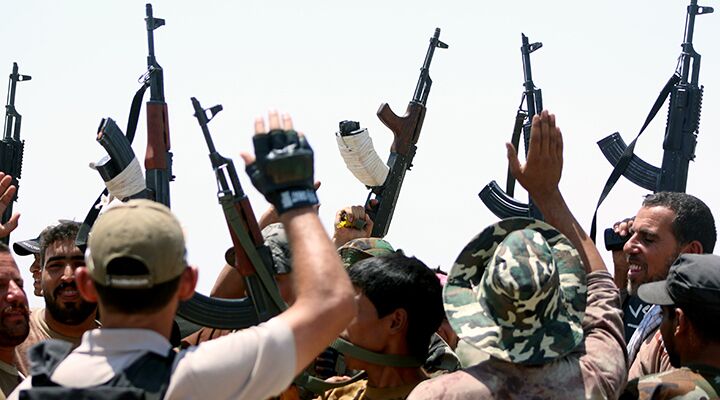
Iran-Iraq Relations Cooling
After months of battling the Islamic State in Iraq, evidence indicates that the Iraqi government may be growing tired of the “help” it is receiving from Iran.
After only a year in power, Iraqi Prime Minister Haider al-Abadi has already implemented sweeping changes across the nation, many of which have drawn the ire of Iran. Abadi’s actions are curtailing Iran’s influence, leading to serious conflicts between the powers that be.
Government Shakeup
Prompted by protesters and civil unrest, Abadi has taken measures to stem the corruption that was endemic throughout his predecessors reign. Slashing large swathes of bureaucracy, Abadi has been targeting a wide array of government factions.
Of course, while this does reduce the corruption and needless expenses associated with a bloated government organization, there are other side benefits.
When he stepped down from office, former Prime Minister Nouri al-Maliki still retained certain positions in the government. One such office was that of vice president. But not anymore. Maliki was fired by Abadi in the midst of the government purge. As former prime minister and a close ally of the Iranian government, Maliki was a considerable contender to Abadi’s rule over the nation. But a purge of the government has seen Maliki, and many more long-serving officials, stripped of office.
Further still, Abadi has launched a massive corruption inquiry. Closed cases are being reinvestigated, and many current and former Iraqi government officials are under scrutiny.
Iran worked for years with the Maliki government. Many Sunnis and other minorities in Iraq accused the Maliki government of being an Iranian puppet. And looking at Maliki’s pro-Shiite, pro-Iranian policies, it is hard to imagine otherwise.
Iran has invested a lot of time, money and effort into having a strong influence within the Iraqi political system. It won’t take kindly to Abadi’s government shakeup.
Control of the Skies
Iran uses Iraqi airspace as a highway for Iranian weapons and other aid to reach Syrian dictator Bashar Assad. Since the civil war in Syria began, Iran has enjoyed relatively hassle-free access to the skies between Iran and Syria.
Now however, Abadi is keeping tabs on what flies over his country. One particular incident saw an Iranian cargo plane forced to remove all its contents on the tarmac of an Iraqi runway. It took only a few minutes for Iranian diplomats and Islamic Revolutionary Guard Corps troops swarmed to the airport.
Iraq has been a crucial link for Iran. Iran needs access to and from its allies west of Iraq. The luxury of unchecked, unhindered flights was a huge benefit for Syria and Hezbollah.
Iran can ill-afford to lose this lifeline to its proxies. If Abadi’s interference escalates, it could prove troublesome for Iranian interests in the region. With no clear path to Iran, Assad could find himself cut off and alone.
Taming Suleimani
Ever since the Islamic State routed the Iraqi Army from the north of the country, Iranian-backed militias have played a crucial role in preventing the entirety of Iraq from falling into the hands of the Islamic State. Led by the once-covert leader Gen. Qassem Suleimani, the Shiite militias have thwarted the Islamic State’s advance towards Baghdad, protected Shia religious sites and towns, and routed the terrorists from pivotal cities such as Tikrit.
Throughout Iran’s campaign, Suleimani has worked to establish himself as the perceived protector of the Iraqi people—including the government.
But such an auspicious title is also marred by allegations of brutality, particularly against Iraq’s Sunni population. After lost territory is reclaimed, the “liberated” population often comes under a second attack by their supposed liberators—Suleimani’s militias.
The Sunni population is obviously upset with how much influence the Shiite militias have, and the people are taking their grievances to the government. Eager to win their favor, Abadi has started working to undermine Suleimani’s power.
The two men have reportedly had heated meetings in recent weeks. In one such meeting, Suleimani was dismissed after a fiery confrontation. The two men have taken to state television to express their displeasure with one another’s policies.
Iran Won’t Let Go
The aforementioned facts and allegations lend themselves to the idea that Iran is losing its grip on Iraq. It is understandable that there should be some kickback from the government. Nobody in any modern political system wants to lose power. It would appear that Abadi is far less comfortable playing the role of Iranian puppet than his predecessor was.
But like it or not, Iran is there to stay. Under the previous administration, Iran’s ability to influence the nation was almost solely political. Now however, Iran holds a much more powerful card to play.
With the United States so reluctant to join the fight, Iran is being allowed to have an increasingly noticeable military presence in the country. In fact, Iran and its Shiite militias are a major reason that Iraq hasn’t been completely overrun. The roads to Baghdad are in large part defended by the Shia militants. If they were to stand down or withdraw, it would be a short road to Baghdad.
This fact—the fact that Iran can swing the course of the war at will—must be playing on Abadi’s mind. How far can he really push Iran? He may not like the meddling, or the power plays by Iranian generals, but the simple truth is that right now he needs Iran.
Regarding Iraq, Iran is in a totally new scenario. It has both political and military clout. Keep watching. Abadi can try all he wants to shake Iranian influence from his country, but Iran isn’t going anywhere. It has interwoven itself into the establishment since the fall of Saddam Hussein. Now it has the military presence as well.
Iran’s regional goal to establish itself as the king of the Middle East means Iraq is too pivotal to be let go.
